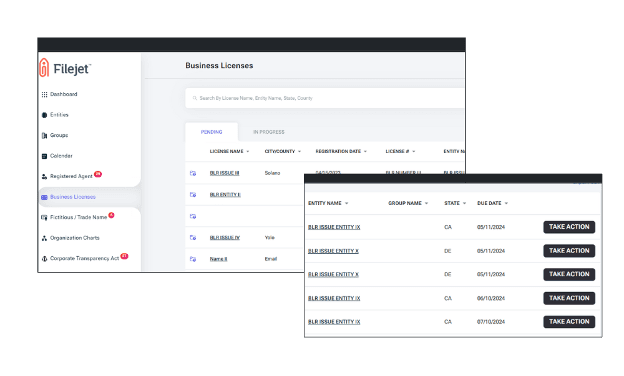Everything You Need to Know About Business Licenses
If your organization operates across multiple jurisdictions, managing myriad business licenses can become cumbersome. Here’s everything you need to know about business licenses – including how to keep them compliant.
If you oversee licensure for your organization, it’s likely you’re responsible for maintaining at least a handful of business licenses. Properly maintaining these licenses is critically important for both legal compliance and tax purposes – but can quickly become an unwieldy and time-consuming task. Without a structured maintenance program in place, it can be difficult to reliably keep up with annual report filings, renewals, amendments, and more. These challenges compound when your organization is scaling, restructuring or acquiring new or divesting outgrown assets.
To help navigate the complexity of the process, here are answers to the most commonly asked questions we receive about business licenses – and how to keep your licenses organized and compliant.
What Is a Business License?
At the most basic level, a business license is any license or permit an organization must hold to operate in a particular location. Under the umbrella term “business license” a number of specific types of licenses exists. Depending on your industry and the nature of your business, you may need to obtain a federal, state, county, city, or municipal license – or any combination thereof. Maintaining appropriate licensing is key to remaining legally compliant – and enables you to conduct your business without interruption.
What Are the Most Common Types of Business Licenses?
Local Business Licenses
A number of “local” business licenses and permits – that govern everything from zoning to building and planning to signage – exist. These licenses may be issued at the city, county or municipal level.
The most common and basic local license is a local business operating license. This license permits you to legally operate your business in the town, city, county or municipality of your choice. For more information, visit your city or county’s website.
State Business Licenses
The majority of states require organizations operating within their borders to hold some form of state business license. Like local business licenses, there are a variety of state-level business licenses your organization may need to maintain, but the most basic type is a state business operating license.
State business operating licenses grant your business permission to legally operate in the state of your choosing. The license is primarily used to track your organization’s revenue for tax purposes. For state-specific business license information – including issuing offices – visit the National Association of Secretaries of State’s website.
Federal Business Licenses
Business licenses at the federal level are only required for organizations that conduct certain activities within the following industries:
- Agriculture
- Alcoholic beverages
- Aviation
- Commercial fisheries
- Firearms and explosives
- Fish and wildlife
- Maritime transportation
- Mining and drilling
- Nuclear energy
- Radio and television broadcasting
- Transportation and logistics
Applications, filings and renewals for federal business licenses are handled by separate, industry-specific federal agencies like the U.S. Department of Agriculture and Federal Communications Commission. For more information about federal licenses – including regulated activities and issuing agencies – visit the U.S. Small Business Administration’s website.
Industry-Specific Licenses
Depending on your organization’s industry and activities, you may be required to obtain and maintain certain industry-specific licenses. These licenses are generally required for regulated businesses including salons, hotels, commercial care facilities, and more.
Note: “business licenses” are different from professional service licenses. Professional service licenses are tied to occupations in regulated professional industries like medicine, teaching, law, counseling, and more. While you, personally, may need to maintain a professional service license, these activities are separate from the management of your organization’s business licenses.
How Do I Get a Business License?
The application process varies, depending on the jurisdiction and type of license. But, generally speaking, most business license applications will require you to submit the following information:
- The name of your business
- Your business entity type (S Corp, LLC, etc.)
- Your business address and phone number
- Your employer identification number (EIN)
- Your insurance information
- Your projected revenue and anticipated operating costs
You are generally required to submit payment along with your application, the cost of which will vary by jurisdiction and license type.
How Do I Keep My Business Licenses Compliant?
Regular upkeep is required to keep your business licenses in good standing. The most routine maintenance tasks are:
Annual Report Filings
Annual reports must be submitted to the secretary of state(s) where your organization operates each year or, sometimes, every other year. If your organization does business in multiple states, separate annual reports must be filed with each appropriate secretary of state. Each state has its own filing due date and fees.
Annual report filings generally include the following information:
- General operational information – including your business name, EIN, address, DBAs, business entity type, etc.)
- The names and business addresses of certain managers and shareholders
- Information about the purpose of your business
- Your registered agent’s information
- Relevant financial information
Renewals & Amendments
All business licenses must be renewed regularly to maintain good standing. Like annual reports, these filings are typically due annually or biannually, depending on the jurisdiction and type of license. Specific requirements and fees vary.
Certain jurisdictions also require you to update licensing agencies whenever major changes are made to your business including:
- Change of ownership or corporate officer
- Change of address
- Change of name or DBA name
- Change of business activities
What Happens if My Business License Expires?
If you don’t file your annual report or renew a license in a timely manner, the issuing agency will notify your organization and you will likely be subject to a fine. Failure to file your report or renewal after being notified, may result in the administrative dissolution of your license – and your organization falling out of good standing.
Falling out of good standing can prohibit you from operating in certain jurisdictions and may prevent your business from being able to scale. It can also cause reputational damage, lessen the perceived value of your organization, impair credit, and halt or block deals.
What’s the Best Way to Manage Business Licenses?
If your organization operates in multiple jurisdictions, it can be difficult to keep your licenses organized and compliant – especially if you use a manual process or traditional, registered agent. Spreadsheets are notoriously error prone and are proven to be an unreliable way to track critical data. Traditional registered agents offer limited transparency and can sometimes fail to forward critical mail in a timely manner, which can jeopardize your ability to remain in good standing.
The most reliable way to keep your licenses up to date is with entity management software that automates annual report filings and renewals. In addition to automatically filing on your behalf, the right solution will have a collaborative and transparent interface so you and stakeholders can reference a single source of truth and have confidence that your licenses are being properly maintained.

Filejet is cloud-based entity management software that automates annual report filings, business license renewals, amendments, and more for U.S. and international entities.
These offerings are backed by Filejet’s digital registered agent service, which leverages software and human support to upload all official correspondence to a transparent, easy-to-navigate portal. These services remove the administrative burden of annual filings and renewals from your team – while ensuring you remain in good standing.
